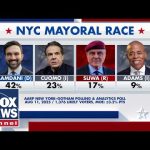Kla Harris once stood firmly under the banner of “defund the police,” arguing that more police don’t necessarily mean more safety. It seems the idea of reimagining safety is much easier said than done, especially when one’s own safety is at stake. With her Secret Service detail having ended as per protocol after six months, Harris briefly embraced a familiar comfort: police protection. But not just any protection. For a short time, she had up to 11 LAPD Metropolitan Police officers keeping an eye on her every move as she navigated her glamorous Brentwood life of Pilates and sushi.
While Harris enjoyed this security detail, reminiscent of a Hollywood action movie, one must ponder the irony here. The same elite unit that would typically investigate serious crimes in LA was momentarily on chauffeur duty for Harris. Why, you ask? Well, they were making sure she didn’t spill any soy sauce on her designer ensemble. It’s indeed a curious turning of the tables for someone who advocated for a policing system that’s less, well, police-y.
Now, let’s zoom in a bit on the taxpayer angle. Los Angeles residents might be wondering why their hard-earned dollars were funding what some called a “door dash police force” for Harris. Isn’t she well-off enough to arrange her own private security detail, given all her public engagements and book royalties? It appeared that instead of contributing to public safety, these officers were safeguarding Harris’s leisurely moments away from the pageantry of public life.
Adding another layer of intrigue to this story, Harris isn’t holding any official title requiring such taxpayer-funded protection. She’s neither a federal nor a state official. She’s not even on the local school board. So what exactly justified redirecting precious police resources away from genuine city needs? In a city like LA, grappling with real issues like crime and homelessness, the optics of Harris’s situation weren’t doing any favors for her former party colleagues.
As LA faces real problems, Harris briefly enjoyed the benefits of protection once reserved for more grounded purposes. Her situation offers a comedy sketch-like punchline about political irony. While the city contends with its challenges, residents were left with a blend of amusement and frustration, watching their resources momentarily protect someone who once believed fewer police could mean more safety. At the end of the day, this chapter might serve as a reminder that actions—and protective details—speak louder than words.




